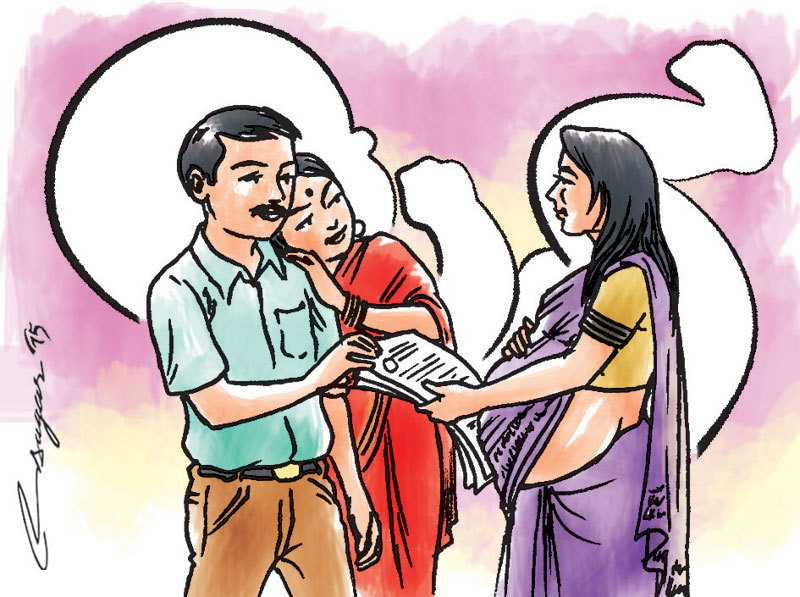Surrogacy in Nepal: Threat to reproductive right
Due to absence of specific laws, many Nepalese sisters and daughters are secretly becoming surrogate mothers for foreigners under pressure and lure to which Nepal Government cannot close eyes and ears
Surrogacy is a process where people wanting babies pay for another women to have their baby delivered. Among the two methods of surrogacy, traditional method involves inseminating the sperm artificially in the mother’s womb who contracts to deliver baby on behalf of the couple whereas in modern gestation method, sperm and egg from a father and mother is fertilized first through in-vitro fertilization and the embryo is placed into the womb of surrogate mother.
Two years ago, rules on commercial surrogacy were tightened in India. Currently, after imposition of ban to use surrogate mother by Indian government, large numbers of centres have mushroomed in the Kathmandu Valley. Legalizing surrogacy itself has been disputed in several countries.
Door has been opened only for the foreigner couples to have babies through surrogacy in Nepal after Cabinet decided on September 18, 2014 neglecting the spirit of our National Health Policy, 2014 in the name of promotion of medical tourism in the country. The National Policy directs government to adopt surrogacy laws for addressing infertility of Nepalese citizens whereas the cabinet decision deviated from this spirit giving unnecessary emphasis to promote medical tourism in Nepal and attract foreign investment rather than to implement the spirit of our health policy.
The decision permits surrogacy only to foreigners and does not allow Nepalese to either donate sperm, egg or rent womb. Superficial decision from Cabinet without adequate preparation alone is not enough to address the modern complexities of surrogacy in Nepal. In the absence of specific laws, there is high chance of abuse leading to women trafficking and forced surrogacy for money.
There are serious issues that government needs to urgently address prior to making rush to announce for global surrogacy in Nepal. There are following numerous vacuums in law and these should be fulfilled without delay: Legal rights and duties of a surrogate mother; status and rights of a baby delivered through surrogate mother including baby’s right to inherit parental property; standard of cleanliness; standard of medical expertise. Ethics of fertility clinics, liability for fertility clinics, physicians and nurses liable for medical malpractices if they intentionally breach surrogacy ethics, social stigmatization.
Some say Nepalese take surrogate mothers to India for delivery for fear of social stigma. Regulation of applying for medical visa by foreign couples in order to pursue surrogacy in Nepal, statutory procedure to grant of genetic parent’s citizenship and not of biological mother’s to the baby born in Nepal are some pressing issues. Who shall entertain jurisdiction to investigate and take action against violations of medical ethical issues either an autonomous Nepal Medical Council or Health Ministry?
Due to absence of specific laws, many Nepalese sisters and daughters are secretly becoming surrogate mothers for foreigners under pressure and lure to which Nepal Government cannot close eyes and ears. In absence of laws, the cabinet decision on surrogate babies are prone to massive abuse leaving high chances of Nepali women being exploited financially through agents, and male relatives to carry and deliver babies for foreigners. Commercial surrogacy is practiced in Nepal but no one wants to talk.
Followed by the Cabinet decision, many foreigners including Israelis, Americans, Australians, Europeans, Canadians have had surrogate children in Nepal. Many European countries have banned surrogacy and it is strictly regulated and expensive in the United States.
While it can cost up to $150,000 to have a surrogate baby in the West, in Nepal it is performed till date at a little amount of $6,000 with the surrogate mother often not getting the money that her husband is paid as fee.
Doctors and hospitals keep quiet because surrogacy is illegal for Nepalese. Surrogacy in India and Nepal are managed by middlemen working with political protection, and there is a nexus between them and private hospitals. It is a question of supply and demand: there is a demand in rich countries for babies, and there is a supply of poor families in developing countries willing, and sometimes forcing, their women to become surrogate mothers.
Surrogacy policy should be based on National health policy and not on political pressure and financial lure. The decision of cabinet shows some foul play because National Health Policy focuses surrogacy practice to address infertility among citizens whereas the cabinet decision intends to promote medical tourism.
The reason for private hospitals and government to rush towards passing a cabinet decision without adequate homework might probably be the commercialisation of motherhood through surrogacy which in itself is highly lucrative. However it should not be forgotten that this issue is associated with cultural, social, economic and political questions.
We must be aware of the fact that surrogate mothers are not just factories for manufacturing babies rather they have their right to reproductive health and be free from any sorts of exploitation that might be created due to negligent governmental decisions.
Parajuli is an advocate






